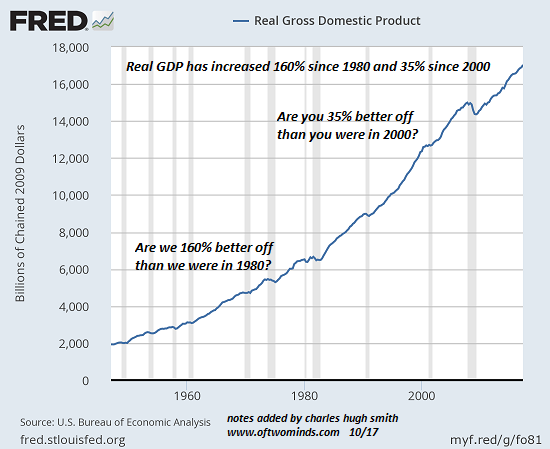Summary:
Here’s a chart of our fabulous always-higher GDP, adjusted for another bogus metric, official inflation. The theme this week is The Rot Within. The rot eating away at our society and economy is typically papered over with bogus statistics that “prove” everything’s getting better every day in every way. The prime “proof” of rising prosperity is the Gross Domestic Product (GDP), which never fails to loft higher, with the rare excepts being Spots of Bother (recessions) that never last more than a quarter or two. Longtime correspondent Dave P. of Market Daily Briefing recently summarized the key flaw in GDP: GDP doesn’t reflect changes in the balance sheet, i.e. debt. So if we borrow money to pay people to dig holes and
Topics:
Charles Hugh Smith considers the following as important: Featured, newsletter, The United States
This could be interesting, too:
Here’s a chart of our fabulous always-higher GDP, adjusted for another bogus metric, official inflation. The theme this week is The Rot Within. The rot eating away at our society and economy is typically papered over with bogus statistics that “prove” everything’s getting better every day in every way. The prime “proof” of rising prosperity is the Gross Domestic Product (GDP), which never fails to loft higher, with the rare excepts being Spots of Bother (recessions) that never last more than a quarter or two. Longtime correspondent Dave P. of Market Daily Briefing recently summarized the key flaw in GDP: GDP doesn’t reflect changes in the balance sheet, i.e. debt. So if we borrow money to pay people to dig holes and
Topics:
Charles Hugh Smith considers the following as important: Featured, newsletter, The United States
This could be interesting, too:
Nachrichten Ticker - www.finanzen.ch writes Die Performance der Kryptowährungen in KW 9: Das hat sich bei Bitcoin, Ether & Co. getan
Nachrichten Ticker - www.finanzen.ch writes Wer verbirgt sich hinter der Ethereum-Technologie?
Martin Hartmann writes Eine Analyse nach den Lehren von Milton Friedman
Marc Chandler writes March 2025 Monthly
Here’s a chart of our fabulous always-higher GDP, adjusted for another bogus metric, official inflation.
The theme this week is The Rot Within.
The theme this week is The Rot Within.
The rot eating away at our society and economy is typically papered over with bogus statistics that “prove” everything’s getting better every day in every way. The prime “proof” of rising prosperity is the Gross Domestic Product (GDP), which never fails to loft higher, with the rare excepts being Spots of Bother (recessions) that never last more than a quarter or two.
Longtime correspondent Dave P. of Market Daily Briefing recently summarized the key flaw in GDP: GDP doesn’t reflect changes in the balance sheet, i.e. debt.
So if we borrow money to pay people to dig holes and then fill them with the excavated dirt, GDP rises to general applause. The debt we took on to fund the make-work isn’t accounted for at all.
Here’s Dave’s explanation:
Once I learned about accounting, I figured out why the GDP metric wasn’t sufficient. What is missing?
The balance sheet.
Hurricanes are a direct hit to your nation’s balance sheet. The national income statement goes up because of increased spending to replace lost assets, but the “equity” part of the national balance sheet ends up taking a hit in direct proportion to the damage that occurred. Even if you rebuild everything just the way it was, your assets remain the same, while your liabilities have increased.
We know this because we use the balance sheet equation: equity = assets – liabilities. Equity is another word for wealth.
Before hurricane:
wealth = (house + car) – (home debt + car debt)
After hurricane, you rebuild your house, and buy a new car, using borrowed money:
wealth = (house + car) – (2 x home debt + 2 x car debt)
Wealth (equity) has declined by the sum (home debt + car debt)
So when you see pictures of a hurricane strike, you can now look through all that devastation and see the impact on the balance sheet. National equity (wealth) just dropped by the amount of damage inflicted by the hurricane. Whether it is ever rebuilt doesn’t actually matter; that equity is just gone. Destruction is always a downside for equity – even if there is a temporary positive impact on the income statement.
Isn’t it interesting that the mainstream economists, who don’t use banks, debt, or money in their models, largely ignore balance sheets and instead just looks at the income statement alone? Its almost as if the entire education system was organized so that people paid no attention to banks, debt, and money. Who do you think might benefit from our flock of PhD economists ignoring the extremely profitable debt-elephant in the room, and its purveyors, the banks?
| Thank you, Dave, for an explanation we never see in the mainstream. And here’s a chart of our fabulous always-higher GDP, adjusted for another bogus metric, official inflation: |
US Real GDP, 1940 - 2017(see more posts on U.S. Gross Domestic Product, ) |
Tags: Featured,newsletter

